Selcuk Atli is CEO of mobile social games platform Bunch.
Many view blockchain technology as one of the key building blocks of the metaverse.
While many others are against the use of NFTs and blockchain in gaming, I think it’s important to ask the question, “Is blockchain a required foundation for the metaverse?”
To answer this question, it’s important to agree on what the metaverse is. Instead of anchoring the definition around technologies like AR/VR or blockchain, I think it’s better to focus on the utility that it provides.
In my view the metaverse is: "Digital spaces to come together, and move from experience to experience." Based on this definition, the metaverse is already here!
Hundreds of millions of people spend time with friends in digital worlds on games like Roblox, Rec Room, Minecraft, and Fortnite every day. At the same time, popular chat applications like Discord allow users to meet up over text, voice, and video chat, and move from game to game.
According to this same definition, they would be considered metaverse applications too.
While emerging metaverse applications like The Sandbox, Decentraland, and Worldwide Webb do leverage blockchain technology, the most popular metaverse applications mentioned above do not utilize the blockchain in any meaningful way.
Then, what is the role of blockchain in the metaverse and why does it matter?
In my view the metaverse is "Digital spaces to come together, and move from experience to experience".Selcuk Atli
Metaverse applications like Fortnite and Roblox do delight users and bring them back every day, without relying on blockchain at all. At the same time, metaverse applications can choose to utilise blockchain to offer meaningful benefits to their community of users such as “true ownership” and “extensible utility”.
True ownership
Metaverse applications have rich creator economies with great content that players love. However, ownership in these ecosystems work much similar to platforms like iTunes.
For example, when consumers buy a song on iTunes, they don’t own the song. They simply license the song from Apple so they can play it on their devices. Similarly, when players buy a skin on Roblox or Fortnite, they are licensing this item from the developer so they can use it in the game.
However, we know players clearly value being able to own their in-game assets. According to a 2020 study published by Newzoo, “75% of the players that are interested in skin trading say they’d spend more on skins if they had a monetary value outside of the game”.
Metaverse applications can utilise the blockchain to allow their players to freely trade or sell their in-game assets such as avatars, skins, and items on open exchanges such as OpenSea, Rare, and Fractal. Thanks to the smart contract, they can even claim royalties from any future secondary sales or pay these royalties out to creators or previous owners of these assets.
Yes, the metaverse owners could create centralised online marketplaces to facilitate trade of their in-game items without using the blockchain at all. However, by utilising the blockchain, players can trade these items on any open exchange without permission from or involvement of the metaverse developer.
Extensible utility
Many people view “extensible utility” as players being able take items or skins they own from one game to another, and use them out of the box, with no effort required by the game developers. This kind of universal interoperability is not feasible, at least anytime soon. As Jules Glegg, principal engineer at Riot Games, explains:
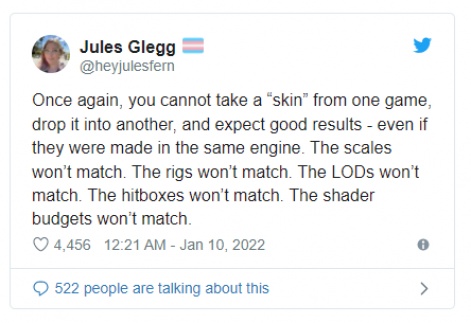
Instead, “extensible utility” will be more about applications being able to offer utility for blockchain assets that originated elsewhere – without having to do business partnerships or custom integrations. A very early example of this is Twitter’s recently launched feature where users can change their profile pictures to NFTs that they own.
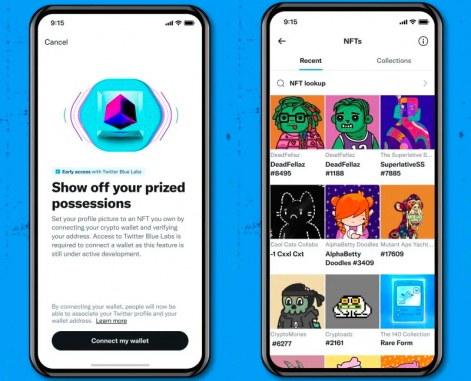
While this is an interesting example for extensible utility made available to a massive audience, we can expect that applications can do even more interesting things with verifiable blockchain assets.
Potential application of “extensible utility” can be more similar to what we could do with Facebook Connect if access to this platform were not controlled by Meta or another large corporation, but instead, if it were controlled by the users.
Let me explain with two examples.
Example 1: Bar owner wants to offer free drinks to Yacht Club Members
Imagine a hypothetical scenario where the owner of a bar wants to attract customers who are members of a nearby yacht club. And to do that, the bar owner wants to offer free drinks (utility) to members of this club who who visit the bar.
Without blockchain, the bar owner would need to do a partnership with the yacht club to verify that a customer who walks in is a member with a 100 per cent certainty. In other words, there would need to be an API integration between the bar and yacht club.
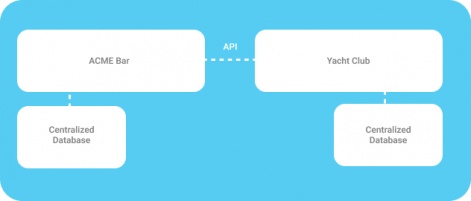
In a Web3 world, the bar owner could let the customers who walk in connect their blockchain wallets and verify that they are club members and claim their free drink!
The cool thing is that the bar owner would be able to do this without requiring any collaboration with the club, or even getting their permission. Heck, any bar in the world could do the same, or they could come up with their own unique offers (utility)!
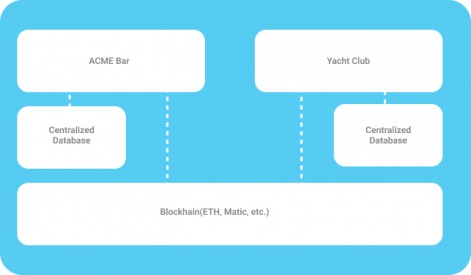
Again, think Facebook Connect where user data is solely owned and controlled by the users.
Example 2: Bunch could make Invisible Friends holders 'invisible'
Let’s think about a more digital example. One of the NFTs and communities that I’m personally excited about is Invisible Friends. They have cool art, over 400K followers on Twitter, and an engaged community.
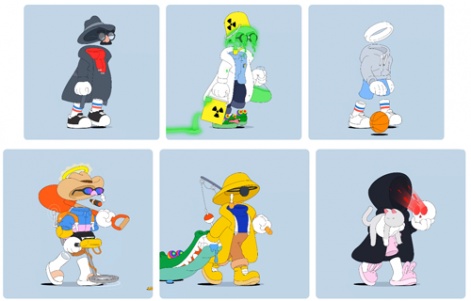
At Bunch, we could let users who own an Invisible Friends NFT have access to an 'invisibility feature' only available to them. To do this, users would need to connect their blockchain wallet on Bunch so we can verify their ownership of the NFT. Then, once we validate that a user owns one of these NFTs, we could let them 'go invisible' (i.e. follow the Invisible Friends theme and art style) in our metaverse as they please.
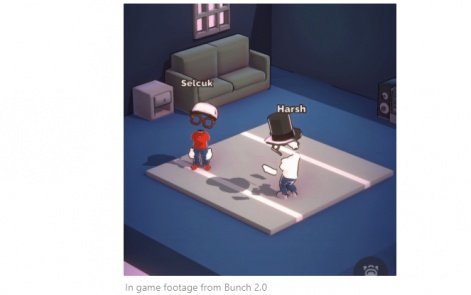
Obviously, we would want to partner with the Invisible Friends community to do this. But we wouldn’t need an API integration – or ask for permission to offer this utility.
From bridges to open protocols
As explained above, blockchain doesn’t guarantee universal interoperability of assets across different applications. The application that would offer utility around the external asset, still needs to do the work to support it.
Let’s call this work “building a bridge”.
The novel thing is that blockchain allows for extensible utility to happen without two way integrations, permissions or commercial partnerships. Over time, these bridges can become open protocols that support interoperability between various games and metaverse applications.
In conclusion
I recall my first time using an internet browser when I was 12 years old. As a gamer, my first instinct was to punch 'Disneyland' in the address bar and be teleported into a digital world with other kids around the globe. While the internet, as we know it, turned out to be different than what my teenage mind imagined it would be, it did change how we communicate, shop, play and work online.
We are in the early innings of what can potentially become the next iteration of the internet. Together we can make it a more natural and more human place, without a small number of corporate gate keepers. We still don’t have most of the answers. I imagine this is what building internet products in the mid-90s or the second year of the smart phone felt like. As builders, we should keep an open mind to new ideas, remain curious, experiment and learn quickly.
One thing that’s for sure is that it is an exciting time to build new internet things.





















